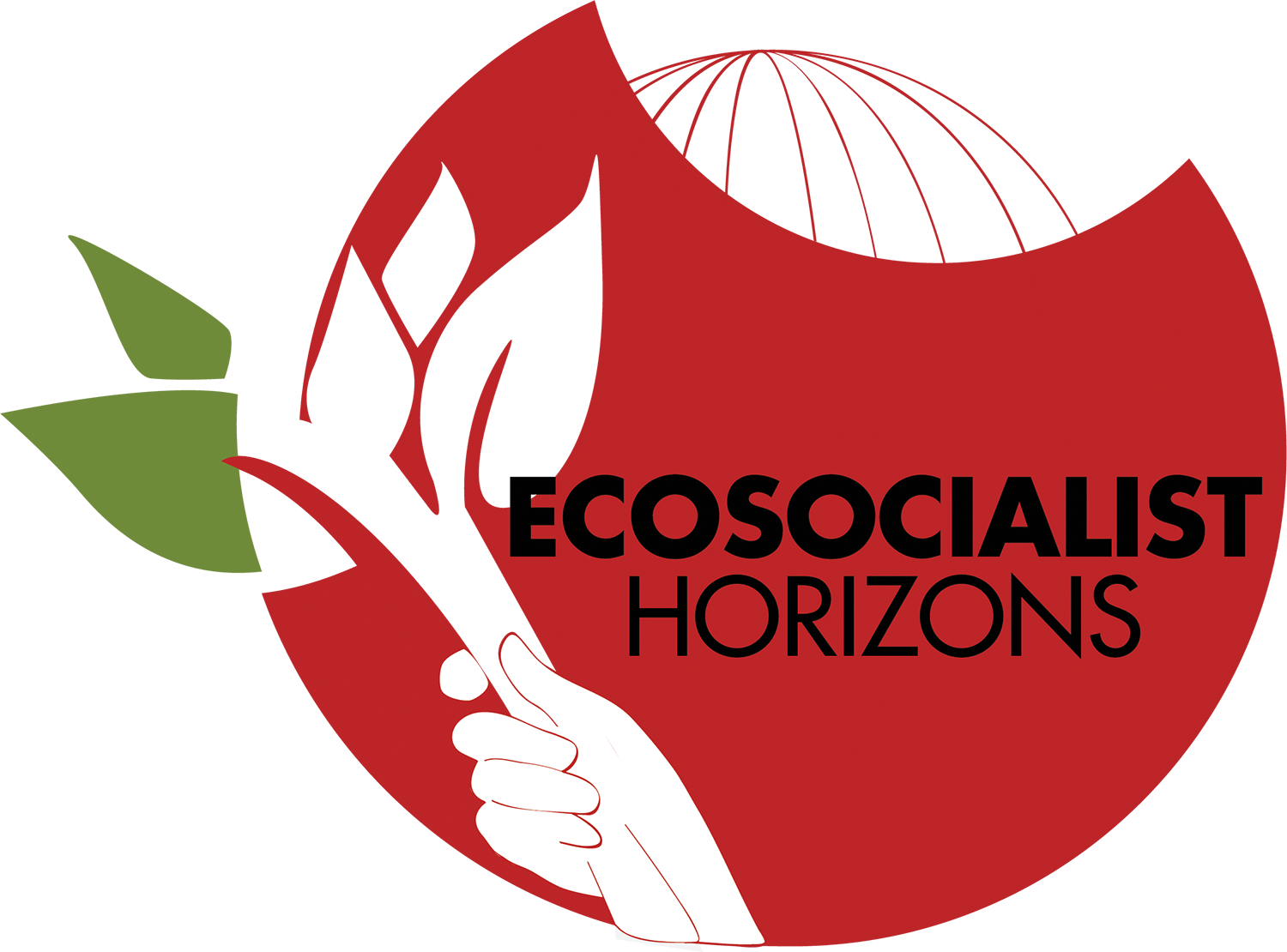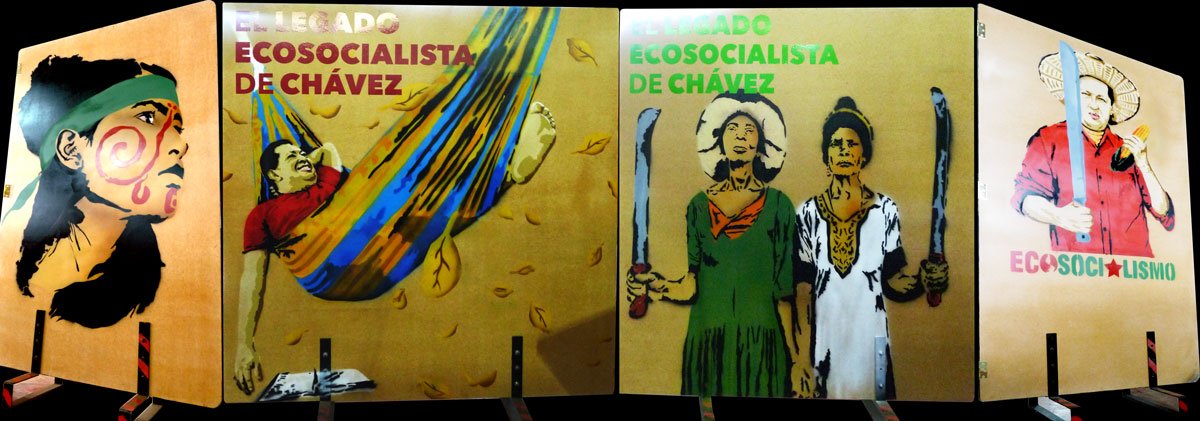Declaration of the Fourth Congress of Biological Diversity
October 30, 2014
Photo Quincy Saul/Ecosocialist Horizons
The following document was drafted and revised in an assembly of hundreds of people on the last day of the Fourth Congress of Biological Diversity, Paraguana, Venezuela. Translated from Spanish to English by Quincy Saul.
En español aqui: Declaratoria+final+IV+CVDB+-+Falcon+2013
IV Venezuelan Congress of Biological Diversity
Falcon, June 23-28, 2013
In struggle for the defense of life, we are reunited at the Fourth Venezuelan Congress of Biological Diversity, on the Peninsula of Paraguana, in the state of Falcon, at the Bolivarian University of Venezuela, between the 23rd and 28th of June, 2013. Inspired by the legacy of President Hugo Rafael Chavez Frias and the Plan Patria 2013-2019, we are beginning to draw ecosocialism: to contribute to the defense of life on the planet and the salvation of the human species.
Here we continue to move forward from the accords and debates that arose during the Third Venezuelan Congress of Biological Diversity, where voices were raised against the (U.N) proposals of sustainable development, the green economy, and the commodification of nature.
CONSIDERING
That the neoliberal capitalist model, in its developmentalist zeal for accumulation, has exhausted itself and reached beyond the limits of nature. Planned by the power of capital, its survival is based on the predatory exploitation of the natural elements of the planet.
That the control of the elements of nature determine the global dynamics and relations of power in the world system, generating the commodification of common goods, such as knowledge, food, air, and water. This control promotes the privatization of life on the planet, through the means of patents and other forms of appropriation that generate violence.
That the natural resources of Venezuela and our (Latin) American countries – due to our strategic reserves of water, minerals, oil, biological diversity and more – are fundamental targets for expropriation, for the benefit of corporations in their agenda of pillage within the capitalist economy.
That in the historic struggles of the peoples of the South can be found new kinds of socialisms: to transform oppressive power relations and to construct popular power, to transcend our alienation from nature, and to focus on love and spirituality as a strategy of struggle to guarantee the (re)production of dignified life.
That the transition to Bolivarian socialism must be found in the ecosocialist legacy of indigenous peoples, in the liberator Simon Bolivar, and in the eternal commander Hugo Rafael Chavez Frias, expressed in a transversal manner in the Historic Objectives of the Plan Patria, 2013-2019.
That one our great challenges in this transition is to resolve the contradiction between ecosocialism and our rentier petroleum culture, which over the last 100 years has configured us as an oil-dependent society. We find this contradiction evident in the tension that exists between the Third and the Fifth Objectives of the Plan Patria, as industrial development threatens the defense of life on the planet.
Considering the necessity to construct in a collective manner the bases of our ecosocialism, we put forward:
OUR POSITION
We denounce the hegemonic powers and proclaim the inviability of their concepts of development and progress as social models, together with their latest versions, from sustainable development to underdevelopment and barbarism, etc, all based on the exploitation of nature as a resource and used as instruments of domination and oppression upon all the cultures of the planet.
We embrace the principle that autonomy is the most precious thing we can achieve, and that only on the basis of independence can we achieve our sovereignty and the preservation of the diversity of lives and cultures.
We ratify our position that sustainable development is not an alternative to the environmental crisis generated by capitalism.
We support all the struggles that sustain life on the planet, those that confront, resist and transform the hegemonic world order of capitalism and its diverse manifestations such as neoliberalism.
We convoke ourselves to permanent mobilization for justice and against impunity, in the memory of our indigenous and campesino brothers and sisters, fallen in the defense of their land, their territory, water, life and dignity.
We believe that the current unsustainable rentier petroleum model of our country, upon which we are dependent, is a transitory passageway that should serve to transcend the capitalist mode of production, toward the construction of the Ecosocialist Communal State. This transformation implies settling the historic social and ecological debt of the State with its peoples and guaranteeing regional integration.
We are alert to the risk that the term ecosocialism could become emptied of content and made banal, through the de-politicized use of people who, directly or indirectly, incorporate in their politics the logic of the corporate agenda.
We are convinced that the construction of ecosocialism demands a change in our economic, political, social and cultural model; it must be based on the insurgency of popular power and constituted in the values that promote diversity, towards a Communal State.
Ecosocialism demands permanent training, organization and mobilization of social movements for the construction and practice of a political paradigm that transcends the neoliberal capitalist model, and substitutes it with a socialist mode of production based on respect for the processes and cycles of nature.
We believe that a basic element of any ecosocialist transition is the change in the mode of production and consumption, which must be accompanied by a matrix of alternative energy which guarantees sustainability and promotes the sovereignty of all peoples.
We recognize the role of the means of communication, and the fundamental strategies of popular communication, in the transformation of the logic of domination and in the construction of ecosocialism. The means of communication are not politically neutral instruments but powerful artillery; tools that should be used for the construction of ecosocialism.
We denounce the destabilizing pretensions of regional, national and international actors who seek to generate a scenario which weakens the Venezuelan state, in order to favor the appropriation of its natural resources by transnational capital, threatening our sovereignty and independence.
We recognize that all the Missions and political programs of the Venezuelan state for the construction of Popular Power, represent an advance of national environmental policies, and we urge that those missions and programs – respecting the cycles of nature – be deepened.
We value the contributions and advances of the National Strategy for the Conservation of Biological Diversity and the National Plan of Action 2010-2020, as instruments of transformative management immersed in the ecosocialist project of the Plan Patria. We recognize the necessity to create efficient follow-through mechanism of the Strategy that will help to generate concrete results, such as the consolidation of information and the creation of indicators. We also recognize the leading roles of all the protagonists in the implementation of the Strategy, who are creating an efficient popular accountability.
We recognize the importance of the Congresses of Biological Diversity as spaces of debate for the construction of policies, for making visible all the struggles and victories of the people, from cultural protagonists to political collectives, and their exchanges of knowledges. For this it is necessary to deepen the creation of structures which guarantee both their continuation in time and participatory leadership in their construction.
We ratify our rejection of the imposition of technologies, particularly those which generate dependency, threaten the sovereignty of peoples, traditional knowledges and methods, and which threaten the diversity of life and the conditions which make life possible on this planet.
We declare that ecosocialism should guarantee food sovereignty as a fundamental right. This right involves not only access to food of adequate quantity and quality, but also involves the logic of respect for the rights of nature, based on a change in the mode of production and consumption, which must be conscious of the limits of the planet and the necessity to value diverse and local agricultural practices.
We affirm that the production of food, and the mechanisms chosen for this production, which include the use of systems of transport, circulation and exchange, are dimensions of human rights, linked with a healthy and ecologically equilibrated environment. We are aware that the hegemonic industrial model, which needs to stimulate the culture of agrochemicals, modern biotechnology and genetic engineering, represents a threat to these rights.
We note that genetically modified organisms represent a threat to biological diversity and all cultures of the planet, and we reject their imposition by the interests of transnational capitalism.
We ratify our commitment to the defense and protection of the biological diversity in the arid zones of Venezuela, and especially the land of Falcon, enclave of this Fourth Venezuelan Congress of Biological Diversity. We support the peoples of Falcon in their historic struggles for emancipation and the defense of life. We recognize the historic and biological importance of the Fila de Montecano and the importance of its protection and conservation.
We declare that ecosocialist ethics are based on respect for the rights and cycles of nature. We are responsible for the care and reproduction of life, and for reaching Buen Vivir, based on the spiritual values of indigenous and local cultures. This ethic promotes socio-cultural dynamics which transcend anthropocentrism, patriarchy, and the separation between humanity and nature.
We affirm that ecosocialism is a form of life and a model of civilization that implies, among many other things: the recognition of the rights of nature; the creation of a new everyday life; the emancipation of the family-unit; the re-politicization of love and spirituality; the ruralization of the cities; the self-construction and self-management of community organizations; the recognition of women and of gender-diverse subjectivities as leading political protagonists; the creation and fortification of educational technologies which arise from the knowledge of peoples; the values of the communal economy, such as barter; the political value of the cosmovisions of the original peoples, of campesinos and Afro-descendants; and the transition from intellectual property to social property; and the primary role of seeds, as identity and tool for the construction of ecological and cultural diversity.


